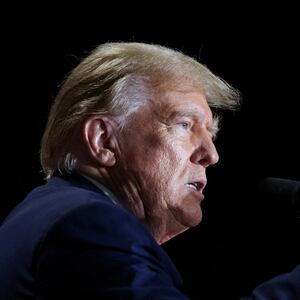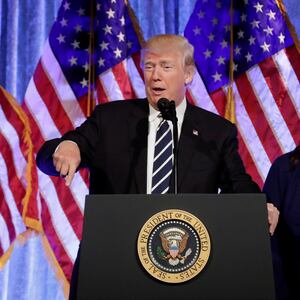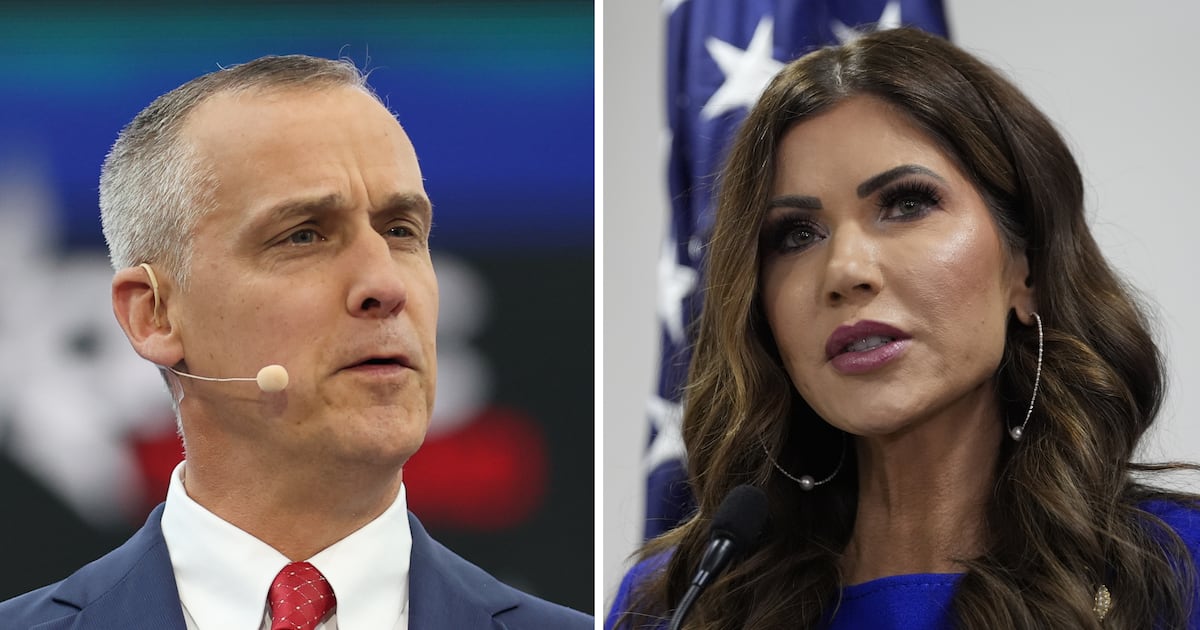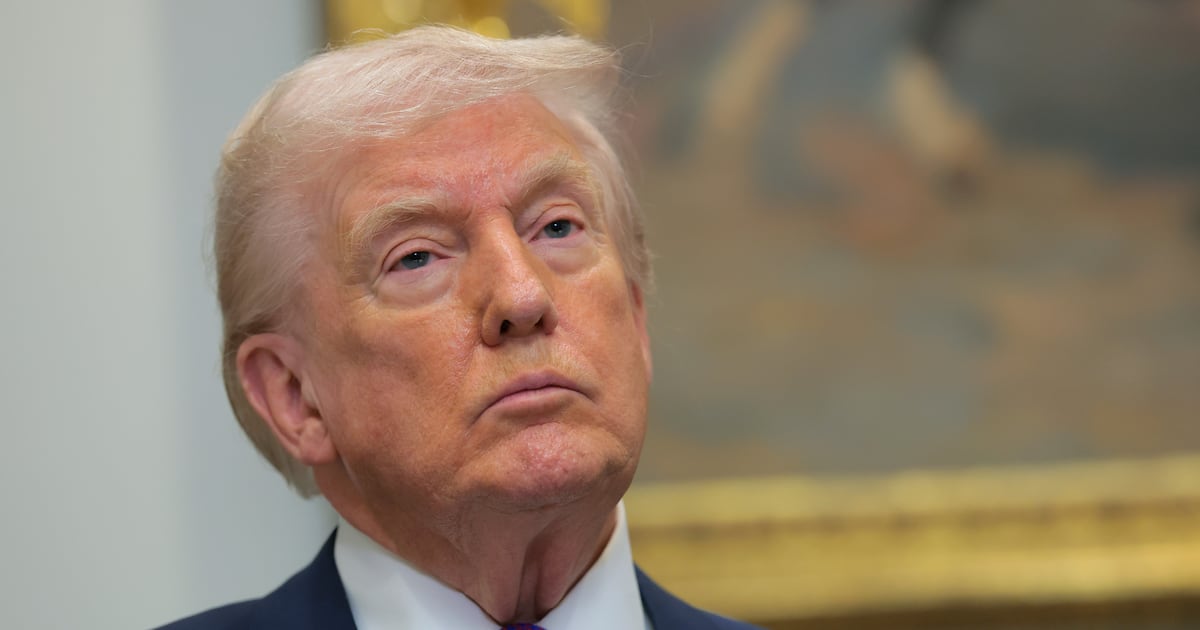After years of accusations of financial mismanagement, the Republican National Committee is overhauling its 2024 election operations—a full-on MAGA makeover that the RNC claims will curb excessive spending and steer as much money as possible to supporting Donald Trump’s campaign.
But it appears that one of those strategic spending moves may have a profound effect on a successful minority outreach program, which two people with knowledge of the plans characterized as self-defeating, potentially erasing gains with groups of gettable new voters who have cooled on the Democratic Party.
As one of the sources put it to The Daily Beast, the tagline might as well be “Make the RNC White Again.”
The program at issue is an initiative from the 2022 midterms where RNC field staff engaged voters through gatherings and events held at community centers in areas with heavy minority populations, most specifically Latino communities.
In January, The Messenger reported that the RNC had already shuttered most of the nearly two dozen Hispanic Community Centers that served as the base for the program, leaving just five open. (The Messenger’s content vanished when it went out of business shortly thereafter, but the article was captured by the nonprofit Internet Archive.)
At the time, however, the RNC chalked the closures up as a temporary byproduct of its budget cycle. However, the organization also announced that it was preparing to double down on these efforts for 2024, opening 40 new centers in Latino, Black, Asian American, Native American, Jewish, and veteran communities across the country. That would include establishing outposts in key battlegrounds like Las Vegas, Nevada, Tuscon, Arizona, Milwaukee, Wisconsin, and Allentown, Pennsylvania, The Messenger reported.
Jaime Florez, the RNC’s Hispanic communications director, told The Messenger that “Democrats have taken the Hispanic community for granted for far too long” and vowed that the RNC planned to capitalize on those opportunities.
“Republicans will continue to make historic investments in Hispanic voter outreach, from opening more community centers to launching ‘Deposita Tu Voto’, that will further our gains with Hispanic voters and deliver Republican victories in 2024,” Florez said at the time.
But two people with knowledge of the plans told The Daily Beast that the RNC has decided to scrap that effort. Instead, the people said, the community center program now appears to be another casualty of the RNC’s recent restructuring—a bloodbath that has already claimed several dozen jobs, including senior leadership posts, along with the apparent decimation of field operations and other strategic realignments that could come at the cost of Republican candidates across the country not fortunate enough to be named Trump.
Instead of going after minority voters, the RNC apparently plans to remake itself even more in Trump’s image.
While the size and complexity of modern presidential races demands close coordination between the candidate’s campaign and the national party, the unique pressures on Trump and the RNC—external and internal—forced a reckoning that has taken that standard teambuilding exercise to a new realm.
The catalyst for those events is the very real prospect of financial crisis now facing the two groups, thanks to stratospheric personal legal costs on Trump’s part and unsustainable fundraising and spending for both organizations. Coupled with demands for unconditional fealty to the MAGA brand—which have exacerbated fault lines within the party—the RNC found itself at an inflection point coming into 2024.
To resolve the tension, Trump essentially took control of the RNC. He forced out longtime chair Ronna McDaniel, replacing her with a trio of MAGA loyalists—including his own daughter-in-law, Lara Trump—who uprooted some of the RNC’s most experienced staff and welded the two organizations into what amounts to a single-purpose machine designed to fuel Trump’s attempt to reclaim the White House.

Former Republican National Committee chair Ronna McDaniel.
Joshua Roberts/ReutersWhile one short-term goal is to minimize costs, the moves could come at great political expense in the long term, especially for down-ballot candidates who depend on the RNC for critical funding and other resources. But there are other intangible losses, like the exodus of talent, a blooming vacuum of institutional knowledge, and sapping momentum from field projects like the community center program.
That project not only had promise, it came at the right time. After ignoring their own “autopsy” of the GOP’s 2012 presidential loss, many Republicans began to court minority voters in the wake of Trump’s 2016 win. As paradoxical as that may seem, given Trump’s rhetoric and policies, those efforts appear to be bearing some fruit.
Today, a sizable portion of minority voters—historically a reliable well of Democratic support—have exhibited a disaffection with the party, particularly in younger demographics, drifting towards Republicans who champion conservative ideologies that have long been culturally ingrained in those communities but had not in themselves inspired voters to change parties.
There are competing explanations for this shift. For instance, some analysts argue it’s more an expression of educational shifts than of racial realignment. But no matter the underlying cause, after Trump’s decisive 2020 defeat in the popular vote, the RNC set about trying to connect with Hispanic groups on the grassroots level.
The community centers were key to that effort. They were viewed as a success and point of pride, sources with knowledge of the project told The Daily Beast. The Messenger described the project’s pitch as “a dream intersection of fun, civic life, candidate recruitment, and GOTV muscle,” reporting that in the midterms the centers hosted events like toy drives, religious services, holiday meals, cultural celebrations—and, for some reason, cryptocurrency workshops.
“Community centers continued to pop up in Hispanic communities and positive headlines continued to flow,” The Messenger reported.
While it’s difficult to measure the cost of these programs, people familiar with the effort shrugged off the expenses as comparatively minimal, especially given the positive preliminary returns. Most of the overhead, they said, would be related to renting space for the centers, along with staffing expenses and incidentals for events.
The RNC previously indicated that the rationalization for temporarily closing the centers was financial, considering the party’s cash woes. But if that’s also the explanation for a permanent shutdown, the savings would be thin.
Federal Election Commission filings show that in 2022, the RNC spent a grand total of just over $2 million on rent, with much of it going to campaigns and state and local parties for joint field work in the midterms. But some outlays give an idea of the cost—such as the $3,500 per month that the RNC paid to “No Limits Community Development” in Georgia. By comparison, around the same time, the RNC agreed to pay $1.6 million to cover Trump’s personal legal costs.
These rent payments also wouldn’t divert a penny of the RNC’s political money. Instead, the rent expenses came out of the party’s “building” account, a specially segregated bank account that can only be tapped for expenses related to buildings and maintenance.
The Daily Beast reached out to an RNC spokesperson for comment, who provided a statement from Trump campaign communications director Steven Cheung. The statement called the criticism of the community center closures “racist” and “complete bullshit,” but did not deny that the program had shut down.
“The racist accusations about the RNC and Trump campaign are complete bullshit, President Trump did more to benefit minority communities during his first term than any other President, especially Crooked Joe Biden, and that’s why he’s polling better with Black and Hispanic Americans,” Cheung said in the statement. (The metric Trump most favors to measure his efficacy as an advocate for the Black community—Black unemployment—reached new record lows under Biden.)
Cheung was apparently referencing a recent New York Times/Siena poll that put Trump 6 points ahead of President Joe Biden in Hispanic voters—a major shift, but in line with the recent inroads that Trump and the GOP have made in certain Latino communities, like southern Florida.
However, the same poll showed that, while Biden’s support among Black voters has appeared to weaken, he still holds a 66-23 lead in that demographic over Trump, who has repeatedly expressed that his multiple criminal indictments are something he has in common with the Black community.
“I think that’s why the Black people are so much on my side now," Trump told attendees at an event for Black conservatives in South Carolina last month. "Because they see what’s happening to me happens to them.”
“President Trump will only continue to make gains with minority communities, just as he did from 2016 to 2020, no matter what the lowlifes at the Daily Beast report,” Cheung added.
The shuttered community outreach program would certainly be one way to do so. But that program was not an entirely smooth ride. It had its critics even within the GOP, who argued that while the initial effort was commendable, minority outreach works best as a long-term, continual investment, not an election-year burst of interest.
“They tried; we appreciate that,” Daniel Garza, executive director of grassroots Latino outreach group the LIBRE Initiative, told The Messenger in January. “But you have to have people on the inside who can advise you—these are long-term things that need to be backed by resources.”
In fairness, some projects themselves had setbacks. In Oklahoma City, the RNC Hispanic Community Center—which has since shuttered—got off to a rocky start.
At the opening of the site in July of 2022, the RNC honored Jonathan Hernandez, president of the Oklahoma College Republicans and a political operative in the state. But Hernandez was arrested less than a week later on charges of indecent or lewd acts with a minor and forcible oral sodomy. He pleaded guilty, got a five-year suspended sentence, and was ordered to register as a sex offender.
After the charges, he had no further involvement with the community center. Now, no one else will either.









